How can technology help to reduce waste?
According to ONU the world population will reach 8.3 billions people in 2030 with an increase of 1 billion people in 13 years. In all of the challenges of a massive increase of the population the increase of waste is one of the biggest. According to a scientific magazine “Science Advances” more than 13 billions tons of waste will be thrown at landfills and at the environment at 2050 if the rates of waste production keep the same.
This is major issue for our Planet Earth and for our own health. With so many tons of waste being produced every day over the entire globe the employes in this industry can not keep up with every trash that enters the center, for example the Sims Municipal Recycling Facility in Brooklyn is the largest recycling facility in the USA it receives around 800 tons of recycling material every single day so with this amount of trash its normal that human employees can’t keep up with everything therefore needing help from technology.
Ok when we think about technology we think about very complex things like flying cars but in this case technology can be as simple as huge magnet to separate metal from plastic. Yes of course there are more complex of using technology for example:
In 2010 in Japan a scientist by the name Akinori Ito developed a machine that turns plastic bags into oil basically the inverse process of how plastic bags are made. This machine is so revolutionary that during the process it does not release polluting gases to the environment is totally “Green”. This invention created in 2010 is capable of transforming 1kg of plastic bags into 1l of oil and it has been already sold to 80 countries
model of Akinori Ito machine
In my opinion in the future I thinks that this waste problem can be solved with a huge help of technology but i’m also afraid that we start to make drastic changes when its too late, we can’t only depend on technology to solve this problem we need to take measures as well. What do I mean with this? Recycling is one of the main option but not only check in your town there must be a kind of event to clean the streets, beaches. There nothing like that in your city? Why not creating your own? If we wait too much to start to do something regarding this topic it can be too late for the Earth and for us. We were given so much the only planet in the solar system with life. I mean, we are one in a million and I don’t wanna get too spiritual, but how are we not a miracle? We are perfectly positioned to the sun so we don’t burn but not too distant so we don’t turn to ice. As Richard Williams once said and I quote “Planet Earth is 4.5 billion years old. Mankind? About 140,000 years old. Let me put that in perspective. If you condense the Earth’s lifespan into 24 hours, that’s one full day, then we have been here on this planet for… three seconds.”
Three seconds and look what have we done, we call ourselves Homo sapiens aka wise man, but are we so wise? Wisdom is different.While intelligence speaks,wisdom listens and we covered our ears to mother nature screams and closed our eyes to all her “Help Wanted” signs. One thing i’m sure only if we do this together as humans we can make it to the fourth second.
“Empathy For Better Future” Youth Exchange opportunity
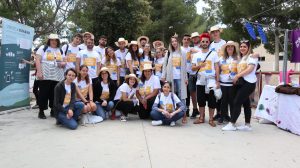
Have you ever thought about participating in a project that involves self development and discovering different people and their cultures?
That’s what we did last week and we would like to tell you more about this awesome experience!
Five different teams, from Bulgaria, Italy, Spain, Portugal and including our team from Romania, gathered in Alicante (Spain) for one week.
This experience was a youth exchange, an activity from the Erasmus+ program, during which we focused on empathy and other soft skills, such as teamwork, teambuilding, communication, social interactions as well as others.
Each of us got new skills and competences, as well as improved those we already had, based on activities using non-formal methods.
We developed our language skills by spending our time with 25 other people from different backgrounds and countries and by sharing our experiences with others.
For some of us, like Cătălin and Alex, this was the first time going in a mobility project, and so far it turned out to be a very empowering experience.
Cătălin: “It was awesome! Just the idea that you get in touch with a lot of people from different countries and get to work together on projects was for me an impulse. You begin to know each other very well and of course to know yourself and to develop skills that maybe were not that improved. ”
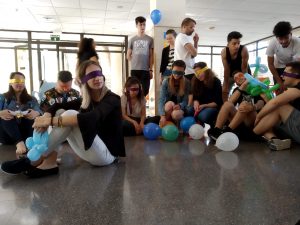
Alex:” We had the opportunity to improve the knowledge of English on a safe environment, and to met new people with different cultures and language so we learned how to work with them and how to have fun with them. We had an amazing week because it was all a new experience and because we saw some amazing places like Alicante and Barcelona and this was like a dream.”
And even if this project wasn’t the first for three participants of our national team, the general feeling is positive and let good results behind it.
Oana: “I for one really enjoyed one of the last activities we had – which was volunteering at a festival here in Alicante for a few hours. I’ve always enjoyed volunteering and I do it a lot in Romania, but doing it abroad felt particularly stimulating and fun. It was a really great experience to feel as part of the community even while being in another country, which further deepened my belief that we are all similar and we can always come together even while being so diverse or sometimes not even speaking the same language. ”
Estelle: “This week was a great opportunity to get new communication skills and to emphasize the empathy notion which is important in everyday life and working with young people. Even if it’s not my first experience, it’s always a strong and awesome opportunity to meet and discover new cultures, and also to create new connexions.”
Going in this kind of project is not only about learning about a topic you might be interested in, but also about having the opportunity to go abroad and discover new places while spending time with other people and having fun.
Our common advice would be: try to go out of your comfort zone and you would be more than grateful to be a participant of this kind of experience!
Te-ai gândit vreodată la cum ar fi să participi într-un proiect care implică dezvoltare personală și descoperirea a diferiți oameni și a culturii acestora?
Asta e ceea ce am făcut noi săptămâna trecută și am vrea să îți spunem mai multe despre această super experiență!
Pentru o săptămână, cinci echipe din diferite tari ale Europei (Bulgaria, Italia, Spania, Portugalia si România) s-au adunat în Alicante, Spania, cu scopul de a se cunoaste si relationa.
Experiența se numeste oficial “youth exchange” (schimb de tineri) si este o activitate a programului Erasmus+, în cadrul căreia ne-am concentrat pe empatie și alte “soft skills”, precum lucrul în echipă, teambuilding, comunicare si interacțiune socială.
Fiecare dintre noi a dezvoltat noi abilități și competențe, de asemenea, imbunatatind pe cele deja existente, sesiunile de invatare fiind bazate pe metode de educație non-formală.
Ne-am dezvoltate atat abilitățile lingvistice, prin prisma faptului ca ne-am petrecut timpul alaturi de alti 25 de oameni din țări cu istorie si traditii diferite, cat și abilitatile de relatioare si accceptare a diferentelor culturale, împărtășind experiențele personale cu ceilalti participanti.
Pentru unii dintre noi, precum Cătălin și Alex, aceasta a fost prima experienta de acest gen, într-un proiect de mobilitate, acesta dovedindu-se una de benefica si de neuitat.
Cătălin: “A fost super! Doar ideea că intri în contact cu o grămadă de oameni din țări diferite și ajungeți să lucrați împreună la proiecte a fost pentru mine un imbold in a-mi dori sa calatoresc cat mai mult. Începeți să vă cunoașteți foarte bine între voi și, desigur, să vă cunoașteți pe voi Înșivă. La finalul proiectului, mi-am dat seama, fara sa vreau, ca am mi-am imbunatatit abilitatile de comunicare, non-verbala, dar si in limba engleza, care poate nu erau atat de bine dezvoltate.”
Alex:” Am avut oportunitatea să ne îmbunătățim cunoștințele de limba engleză întru-un mediu unde ne simțeam în siguranță, și să cunoaștem oameni noi cu limbi și culturi diferite, așa că am învățat cum să lucrăm cu ei și cum să ne distrăm alaturi de ei. Am avut o săptămână minunată pentru că totul timpul nostru a fost presarat cu experiențe noi, dar si pentru ca am văzut locuri minunate precum Alicante și Barcelona. A fost ca un vis devenit realitate.”
Chiar dacă acest proiect nu a fost primul pentru trei dintre participanții echipei noastre naționale, sentimentul general e pozitiv și a lăsat în urmă rezultate bune.
Oana: “Mie personal cel mai mult mi-a plăcut una dintre ultimele activități pe care le-am avut – care a constat în a face voluntariat la un festival aici în Alicante pentru câteva ore. Întotdeauna mi-a plăcut să fiu voluntar și fac asta mult în România, dar să o fac înafara țării s-a simțit deosebit de stimulant și distractiv. A fost o experiență foarte plăcută să mă simt ca parte din comunitate chiar și aflându-mă în altă țară, ceea ce mi-a adâncit mai tare credința că suntem cu toții diferiti, dar similari in acelasi timp. Putem oricând să ne ajutăm unii pe altii, chiar daca locuim la mii de kilometrii departare, sau vorbim limbi diferite.”
Estelle: “Această săptămână a fost o oportunitate grozavă de a obține noi abilități de comunicare și de a pune accent pe noțiunea de empatie, ea fiind importantă în viața de zi cu zi precum și în lucrul cu tinerii. Chiar dacă nu e prima mea experiență, este întotdeauna o oportunitate minunată și puternică de a cunoaște și descoperi culturi noi, și de asemenea de a crea noi conexiuni.”
Participarea într-un astfel de proiect nu este numai despre a învața despre un subiect de care ai putea fi interesat, ci și despre a profita de oportunitatea de a calatori în străinătate și de a descoperi locuri noi, în timp ce petreci timp cu alte persoane și te distrezi.
Sfatul nostru comun ar fi: încearcă să ieși din zonă ta de confort și vei fi mai mult decât recunoscător să fii parte intr-un asemenea proiect!
Interactive lessons on animal protection / Lecții interactive privind protecția animalelor
Although situation concerning animal rights in my homeland, (Croatia), is far from an exemplary one, the number of street dogs and cats in Romania as well as the number of dogs that could be seen kept on very short chains in backyards left me in an unpleasant surprise. After an initial shock the easiest thing would be to let anger and prejudice shape one’s attitude towards the situations. It is also very easy to forget that people’s behaviors are influenced by their environments and that most of the time they do bad things not out of cruelty but because the lack of knowledge. Hence, in situations like this one it is much more useful to approach the problem with patience and openness to a dialogue.
Having been given the privilege and the responsibility to participate in shaping some young minds in Romania, I decided to spend a couple of school hours dedicated to the topic of animal protection. I also decided to broaden the topic on animals in different industries. My first lesson on the topic was with the ninth grade in Maneciu and, honestly, before the class even started I was worried it would turn out to a disaster. How do I get an average teenager think about cruelty of meet farms and animal testing in cosmetics industry? In the worst case scenario the students would see me as a militant vegetarian enforcing her propaganda.
When the class started, my fears faded away. The students approached the topic with curiosity. Their ideas and opinions showed empathy, humor and honesty. “I feel very sad for the chicken but I also love to eat them.”, a sentence that actually in a very simple and unpretentious way sums up all the problematic. At the end of the lesson I didn’t leave the classroom full of new animal rights activist, of course, but I did leave this young people with many new questions and information that by their own words were completely unfamiliar to them before the class. I am not so naïve to think that talking 50 minutes about animal rights will fully change their attitudes but I am very happy to at least scratch the surface.
With six graders I concentrated mostly on talking about stray animals and pets. During the debate they were supposed to move over the line placed in the middle of the classroom floor according to their level of agreeing with a certain statement and then elaborate why and how they chose their position. I have to say that I was very surprised how they listened to each other and treated each other’s opinions with respect. Most of them agreed that animals deserve shelter, that it is not right to physically harm animals and that it is necessary to take sick animal to a vet. However, when the topic of neutering came up, children were very indecisive. Some of them have witnessed horrible scenes like people burning alive newborn kittens and yet they believed that it is really important for an animal to have offspring even if that includes such tragic outcomes. Their view on that matter couldn’t be more different than mine but in the world where many adults remain indifferent to the environment surrounding them, taking sort of “whatever” attitude towards everything, it’s refreshing to see children who think and readily voice their opinions.
Before finishing my story, there’s just one little thing I’d like to mention. Sometime just one specific act of kindness can serve as more positive examples than all the theoretical discussion. That is the reason I would like to thank the former volunteers of Curba de Cultura who have adopted Fifty. Fifty is a former street dog who has been happily sharing home with the volunteers of Schiulesti for more than three years now. To avoid ending the article with some corny phrase, (and when speaking about a dogs it’s difficult for me not to), I’m offering you a photo of Fifty:
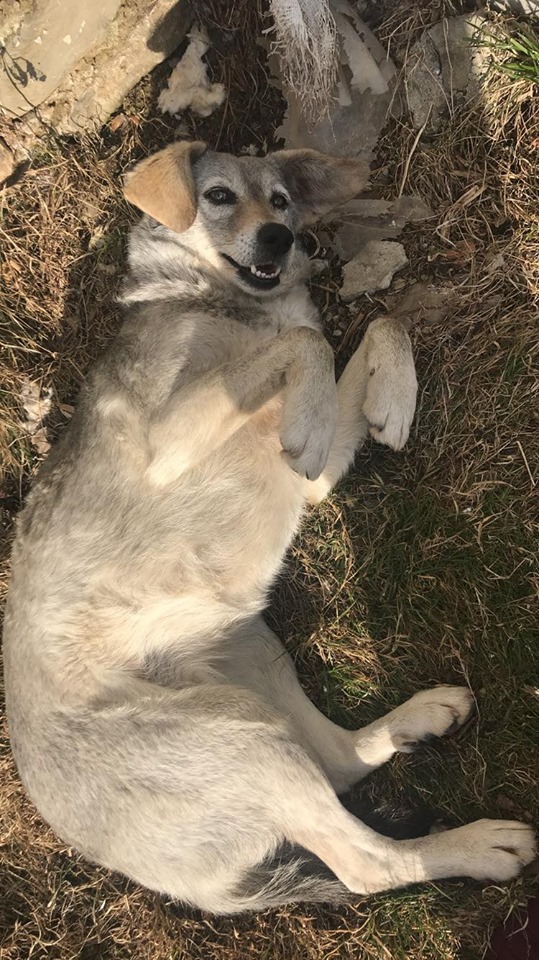
Deși situația privind drepturile animalelor din țara mea (Croația) este departe de a fi una exemplară, numărul câinilor și pisicilor străzii din România, precum și numărul de câini care pe care îi putem vedea ținuți legați cu lanțuri foarte scurte în curțile din spate, mi-au adus o surpriză neplăcută. După un șoc inițial, cel mai ușor lucru ar fi să lași furia și prejudecata să-ți modeleze atitudinea față de situații. Este, de asemenea, foarte ușor să uităm că și comportamentele oamenilor sunt influențate de mediile lor și că, de cele mai multe ori, fac lucruri rele, nu din cruzime ci din cauza lipsei de cunoștințe. Prin urmare, în situații ca aceasta este mult mai util să abordăm problema cu răbdare și deschidere către un dialog.
Având privilegiul și responsabilitatea de a participa la modelarea unor minți tinere în România, am decis să petrec câteva ore de școală dedicate temei protecției animalelor. De asemenea, am decis să extind subiectul asupra animalelor în diferite industrii. Prima mea lecție despre acest subiect a fost cu clasa a IX-a la Maneciu și, sincer, înainte ca lecția să înceapă, am fost îngrijorată că se va ajunge la un dezastru. Cum fac ca un adolescent obișnuit să se gândească la cruzimea fermelor de carne și la testarea pe animale în industria cosmetică? În cel mai rău scenariu, studenții mă vor vedea ca un vegetarian militant care își impune propaganda.
Când a început ora, temerile mele au dispărut. Studenții au abordat cu curiozitate subiectul. Ideile și opiniile lor au arătat empatie, umor și onestitate. “Mă simt foarte trist pentru pui, dar îmi place și să îi mănânc”, o propoziție care, într-adevăr, într-un mod foarte simplu și nepretențios, rezumă toate problemele. La sfârșitul lecției, nu am părăsit sala de clasă plină de activiști noi pentru drepturile animalelor, desigur, dar am lăsat acești tineri cu multe întrebări și informații noi care, prin propriile lor cuvinte, erau complet necunoscute înaintea orei. Nu sunt atât de naivă să cred că vorbind 50 de minute despre drepturile animalelor ei își vor schimba pe deplin atitudinea, dar sunt foarte fericită că cel puțin am atins subiectul.
M-am concentrat alături de 6 elevi vorbind despre animalele fără stăpân și animalele de companie. În timpul dezbaterii, ei trebuiau să se deplaseze peste linia aflată în mijlocul sălii de clasă, în funcție de nivelul lor de acord cu o anumită declarație și apoi să explice de ce și cum și-au ales poziția. Trebuie să spun că am fost foarte surprinsă de cum s-au ascultat unul pe celălalt și s-au tratat reciproc cu puncte de vedere. Mulți dintre ei au fost de acord că animalele merită adăpost, că nu este corect să se facă rău fizic animalelor și că este necesar să se ia animalul bolnav la un veterinar. Cu toate acestea, când a apărut tema castrării, copiii au fost foarte indeciși. Unii dintre ei au fost martorii unor scene oribile cum ar fi oameni care ard puii nou-născuți vii și totuși ei au crezut că este cu adevărat important ca un animal să aibă descendenți, chiar dacă acesta include asemenea rezultate tragice. Opinia lor în această chestiune nu ar putea fi mai diferită decât a mea, dar în lumea în care mulți adulți rămân indiferenți față de mediul înconjurător, luând o atitudine “indiferentă” față de tot, este răcoritor să vezi copiii care gândesc și își exprimă ușor opiniile .
Înainte de a încheia povestea mea, este doar un mic lucru pe care aș vrea să-l menționez. Uneori, doar un singur act de bunătate poate servi drept exemple mai pozitive decât toată discuția teoretică. Acesta este motivul pentru care aș dori să mulțumesc foștilor voluntari ai Curba de Cultura care au adopta-o pe Fifty. Fifty este un fost câine de stradă care a împărțit fericit această casă cu voluntarii lui Schiulești de mai bine de trei ani. Pentru a evita sfârșitul articolului cu o anumită frază (și când vorbim despre un câine este dificil pentru mine să nu), vă ofer o fotografie cu Fifty.
Tea este în România pentru o perioadă de șase luni, din decembrie 2018 până în mai 2019, în cadrul proiectului Volunteer to Grow [2017-1-HR01-KA105-035177] proiect co-finanțat de Uniunea Europeană prin Programul Erasmus+ și implementat în România de către Curba de Cultură.
How will EVS in Romania improve my CV ?

Hello everybody, today I want to write a special article. As written in the title it’s about the relation between EVS and CV. I know that sometime is very complicated to find quickly a job without this paper that traces your professional life. In my case, I wanted to continue my studies in a Master programme but when I finished my bachelor degree I had just a little professional experience. I studied Sociology and History and I wanted to pursue a Communication/Event Management Master. Every answer was negative because of lack of experience or simply because I had not done “the right studies”. But now I know how to improve my CV thanks to my EVS.
Making an EVS was the best idea I had. It’s an experience which can give you the keys to succeed. Thanks to EVS you can be more visible for the recruiters. Effectively, with EVS I improve myself for instance my competences for event organizing, work in an international teamwork, autonomy, communication in English… I succeed to find my professional way and what I want in my life. An EVS is a springboard for your CV, why? First you left your comfort zone, it means that nothing can disturb you. Secondly you went to meet different people and discover their daily life, in this way you are seen as an actor in society with an open mind. In addition during your EVS you must have had to accomplish some tasks, this gives you an experience that some people don’t have when they leave universities or schools.
And to finish the most important is the Youthpass. Is true that the Youthpass is a rather long file to do but it enhances EVERY competence, the things you’ve done and everything you’ve improved. It gives a general idea of your journey, what you have accomplished and what you know how to do. If you have doubts in your life, needs to refocus or make contacts so don’t hesitate to embark on an adventure with the EVS. This isn’t only an adventure for a few months, it can be helpful for the adventure of your life.
Julie este în România pentru o perioadă de opt luni, din noiembrie 2018 până în iunie 2019, în cadrul proiectului Voluntary Generation [2017-2-FR02-KA105-013326] proiect co-finanțat de Uniunea Europeană prin Programul Erasmus+ și implementat în România de către Curba de Cultură.
Aventură de 11 luni în Spania
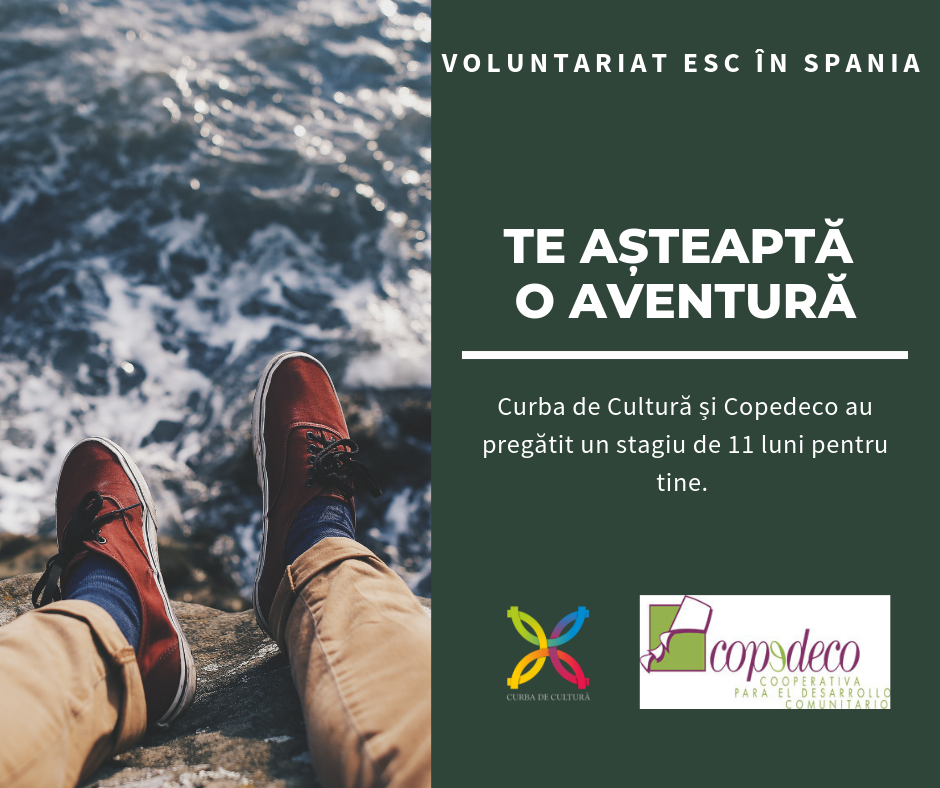
Partenerul nostru Copedeco , din Spania, caută un tânăr sau o tânără pentru un proiect de voluntariat internațional ce începe în septembrie 2019 (pentru 11 luni de zile). Voluntarii vor organiza activități concentrate pe incluziunea socială a copiilor și tinerilor vulnerabili și pe dezvoltarea propriilor abilități și competențe. De asemenea ei vor lua parte la planificarea de evenimente, comunicarea și promovarea online și vor avea și posibilitatea de a-și pune în aplicare propriile idei.
Prin urmare, dacă:
- ai între 18 și 30 de ani
- îți place să înveți și ești curios
- ești activ, lucrezi cu entuziasm și responsabilitate
- ești sociabil și te poți organiza și singur când e cazul
- ești creativ și dornic să îți pui ideile în practică
- ești interesat să lucrezi cu grupuri defavorizate (economic, social etc)
- înțelegi și vorbești engleză acceptabil
- ești dornic/ă să înveți spaniolă
ești potrivit pentru proiectul nostru de voluntariat.
Partenerii noștri din Spania îți vor asigura cazarea într-o casă împreună cu alți voluntari, o alocație pentru masă, bani de buzunar și transport local. Pe lângă asta, primești asigurare medicală și rambursarea transportului până acolo și înapoi.
Ce altceva mai primești?
- cunoștințe și abilități de planificare, organizare și implementare de activități educative și sociale
- posibilitatea de a-ți transforma ideile în proiecte și de a avea o influență pozitivă
- experiență de muncă în lucrul cu copii și organizarea de evenimente
- traiul independent și într-o altă țară
- posibilitatea de a învăța spaniolă și de a-ți extinde cercul de prieteni.
Mai multe detalii despre proiect, aici.
Acum că știi cu ce se mănâncă proiectul ăsta, pune mâna și scrie-ne un email cu CV și scrisoare de intenție (ambele în engleză) atașate în care ne spui de ce crezi că tu ești potrivit pentru acest proiect, cât mai repede la sorin@curbadecultura.ro.
Tot acolo trimiți și întrebările și nelămuririle dacă ai vreounele.
Acest proiect este finanțat de Uniunea Europeană prin programul European Solidarity Corps.

Training C4C – Communication for Cooperation – Next chapter
The training course “C4C – Communication for Cooperation” happened in Slovenia in the beautiful area of Ajdovščina town and her surrounded mountains.
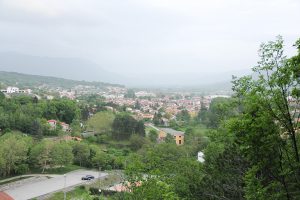
Olga, Laris, Nava and Pina hosted and welcomed us for 6 days of sharing, caring and learning moments. The participants from Portugal, Cyprus, Netherlands, Latvia, Italy, Finland, Spain and Romania gathered to focus on the communication as a tool of cooperation.
We had such a diversity of sessions and methods used in which it was easy to follow and to relate to some daily life situations, personal and/or professional. We set from the beginning a climate of confidence, tolerance and dialogue, in which everybody could feel comfortable to share experiences, knowledge or stories.
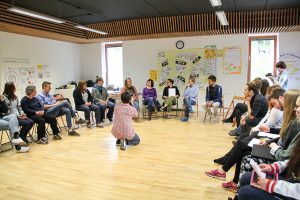
The different sessions of the week had a pleasant flow between theory, practice, visit and self-assessment. We emphasized different notions such as: how to use and receive feedback, how to use mediation and apply non-violent communication, the basis of transactional analysis, the practice of public speaking, the discovery of some ICT tools for the communication such as Canva, Meister task, Logbook, … and Slack, for which I chose to integrate of our communication channel inside our organization, and also took time to visit to the amazing Skocjan caves.
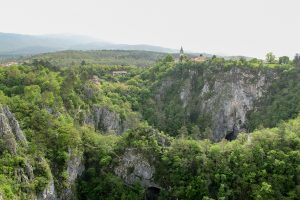
From different backgrounds, the participants were well guided to find their own path as personal level to deal with conflict and to establish a tolerant dialog through the situations we encounter.
All in all, this training in this peaceful place was the best opportunity to raise the importance of the communication skills and the tolerance we are showing towards others.
Different partners part of it: Associazione Agrado, Ha Moment, Together Cyprus, Open Sense, Word Up, Hyvarilao, Egeria Desarrollo Social and us Curba de Cultură.
The “fun” of learning Romanian – Cât de „distractiv” este să înveți română
If one believes the psychiatrist and communication scientist Paul Watzlawick, one cannot not communicate. Conversely, this means that communication can take place on levels other than language. With gestures, facial expressions, the verbalization of sounds, etc.
I have now been in Romania for three months within the framework of my EVS. I have already had all these experiences of the “other” forms of communication. When my decision was made and it was foreseeable that I would go to Romania, I decided (still in Germany) to learn at least some Romanian beforehand. I bought a dictionary, downloaded an app and wanted to inform myself on the internet.
Of course I didn’t use any of this and didn’t learn a single word of Romanian!
There are two ways (there is more but I concentrate on these two) to learn a language. In the context of a curricular lesson or the one of communicating with locals and learning the language through learning by doing.
I have the opportunity to do both.
In our curricular lessons I get to know the different sexes of the nouns or the different forms of adjectives. Of course I also learn the time and how to introduce myself to strangers. I try to find a structure and fathom why this noun is male or why this noun is female. I was told there is no rule. So learn. But if I want to buy sausage in a butcher’s shop, I have to know how this or that verb is conjugated? I don’t think so. This leads me to a funny story that is a good example for the ways of communication.
When I wanted to buy sausage for the first time in the butcher’s shop, I had a very amusing experience.
I wanted to buy two sausages to try them. I tried to make the saleswoman understand that I would like to have these sausages. That was simple. I pointed with my finger at the corresponding sausage. Easy. Then the challenge appeared. I had to make her understand that I would like to have two pieces . So I showed the number two with my fingers. I also said something in English, I was sure it would work. The saleswoman replied, of course, in Romanian. I was able to find out from the phonetics that it was a question. So I nodded my head and said “da”. That means “yes”. In Romanian!
So she began to pack the sausage. Only she didn’t stop after two. She went on and on and I looked very surprised. At some point I realized that my communication had failed. So instead of two sausages I got two kilos! Well, of course I didn’t have enough money with me and had to ask my roommate for the money. My roommates then had the pleasure to eat sausages with me the whole week. Thank God they were excellent sausages. God saves the misunderstandings!
If I had learned some Romanian before or asked my teacher this would certainly not have happened to me. But this story shows how important communication can be. Even if it’s just sausage.
I have never been good at learning foreign languages. I had four years of French at school and can hardly speak a few sentences.
And now I have to learn a language that is so very different from my mother tongue? That means fun!
But of course it is (for me) important to communicate with people in their mother tongue. Even if it is more difficult than I thought before. Some words are very similar to my mother tongue, which I can remember immediately. Important words like potatoes or slippers. Other words sound so abstract to me that I can’t remember them. What I have remembered are the colours. That has the simple reason that I now get the right tobacco and the right papers at the gas station. Nice!
I cannot not communicate. Even if the communication does not always fulfill the purpose I hope for. But that is exactly what gaining experience means. I am sure that nobody will ask me to use the right forms of verbs. But please, I should be able to communicate in the butcher’s shop!
I have another six months to deal with the language and to limit the communication to a verbal one.
The misunderstandings are the real fun. And as long as people still have something to laugh about, it’s totally OK for me.
But just wait and see, one day I will write an article in Romanian!
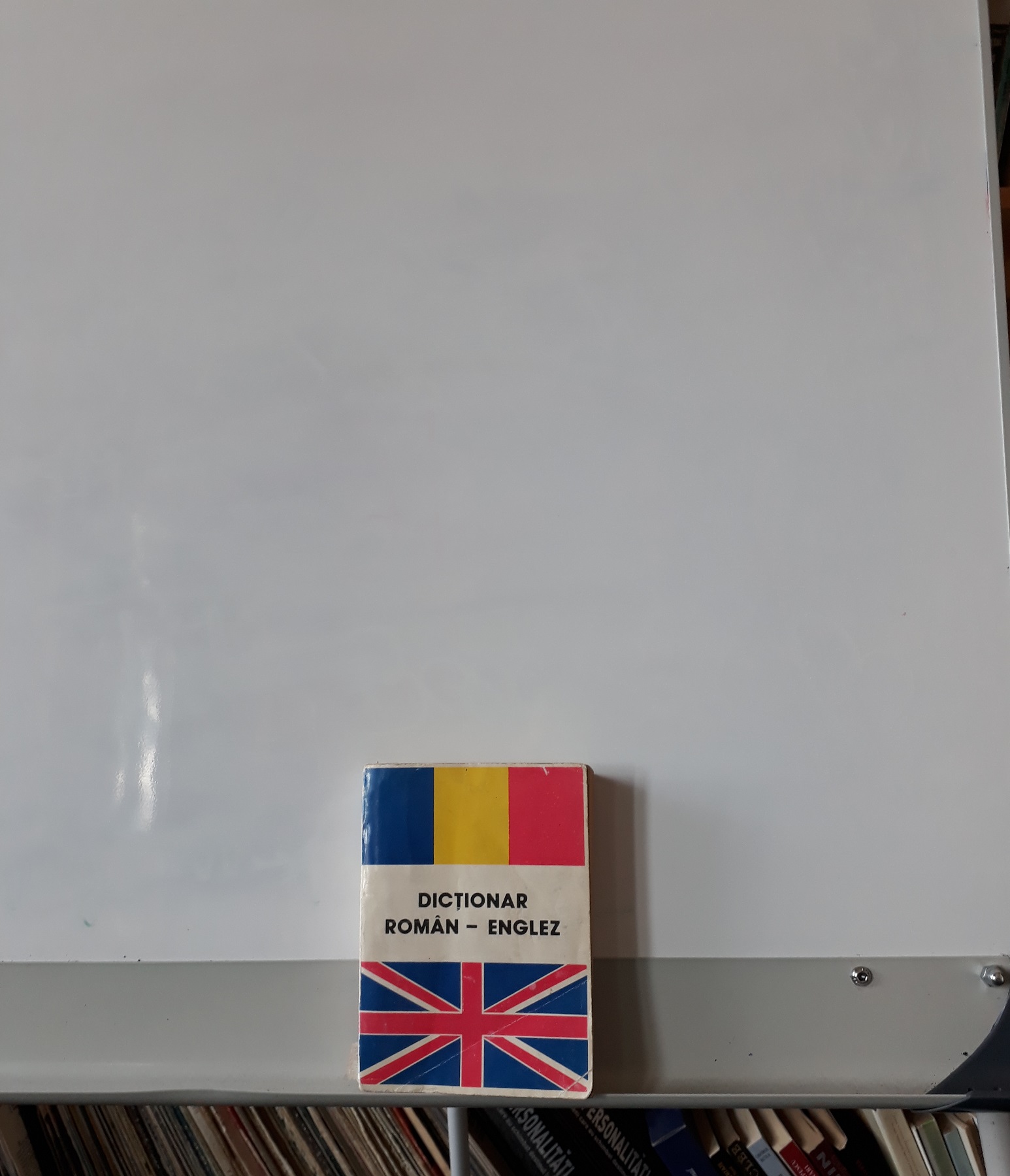
Dacă ne luăm după psihiatrul și specialistul în comunicare Paul Watzlawick, o persoană nu poate să nu comunice. Așadar acest lucru înseamnă că comunicarea poate avea loc și pe alte nivele decât cel al limbajului. Cu gesturi, expresii faciale, verbalizarea unor sunete etc. Sunt în România de 3 luni în cadrul proeictului meu SEV. Am experimentat deja „alte” forme de comunicare. Când decizia mea de a veni în România a fost luată, am zis (când încă eram în Germania) că voi învăța câteva cuvinte în Română înainte. Am cumpărat un dicționar, am descărcat o aplicație și am vrut să mă informez de pe internet. Bineînțeles că nu am folosit niciuna din astea și nu am învățat nici un cuvânt în Română.
Sunt două docuri (există mai mult de două dar eu mă voi concentra doar pe acestea) de a învăța o limbă. În contextul unei lecții pe baza unei curicule ori comunicândcu localnicii și învățând limba vorbind. Am ocazia de a le face pe amândouă.
Pe parcursul lecțiilor am aflat genurile substantivelor și diferitele forme ale adjectivelor. Desigur am învățat și timpul și cum să mă prezint strănilor. Încerc să găsesc o structură și să înțeleg de ce un anumit substantiv este masculin și altul este feminin. Mi s-a spus că nu există o regulă. Prin urmare învață. Dar dacă vreau să cumpăr cârnați de la măcelărie, trebuie să știu cum un anume verb se conjugă? Nu prea cred. Și asta îmi amintește de o întâmplare amuzantă, care este un exemplu bun pentru diferite canale de comunicare.
Când am vrut să cumpăr cârnați pentru prima dată de la măcelărie, am trăit o experiență amuzantă. Am vrut să iau 2 cârnați pentru a-i încerca. Am încercat să o fac pe vânzătoare să înțeleagă că vreau doi cârnați. A fost simplu. Am arătat spre cârnații pe care îi voiam. Ușor. Apoi a apărut provocarea. Trebui să îi explic că vreu 2 bucăți. Și i-am arătat numărul 2 cu degetele. Am zis și ceva în engleză, eram sigur că va funcționa. Vânzătoarea mi-a răspuns în română, bineînțeles. Mi-am dat seama că e o întrebare. Așa că am dat din cap și am zis „da”. Așa se zice „da” în română!
Așa că ea a început să împacheteze cârnații. Doar că nu s-a oprit după doi. A continuat și am fost foarte surprins. Atunci am realizat că comunicarea mea a eșuat. În loc de doi cârnați am primit două kilograme! Ei bine, nu aveam suficienți bani cu mine și a trebui să cer colegului de cameră. Colegii mei de casă au avut plăcerea să mănânce cârnați pentru toată săptămâna. Bine că erau excelenți. Dumnezeu salvează neințelegerile!
Dacă învățam mai multă română ori dacă îmi întrebam profesorul, asta nu s-ar fi întâmplat. Dar această întâmplare ne arată cât de importantă este comunicarea. Chiar și când e vorba de nite cârnați.
Nu am fost niciodată bun la limbi străine. Am avut patru ani de fraceză la școală și abia pot spune câteva propoziții. Iar acum trebuie să învăț o nouă limbă care este atât de diferită de limba mea maternă? Asta înseamnă distracție! Pentru mine însă este important să comunic cu oamenii în limba lor maternă. Chiar dacă e mai dificil decât am crezut înainte. Unele cuvinte sunt similare cu limba mea maternă și mi le amintesc imediat. Cuvinte importante precum cartofi ori șlapi. Altele sună foarte abstract și nu mi le pot aminti sub nici o formă. Ce îmi amintesc sunt culorile. Și asta pentru simplul motiv că am nevoie să cumpăr tutunul și foițele corespunzătoare la benzinărie. Mișto!
Nu pot să nu comunic. Chiar dacă comunicarea nu își atinge scopul la care sper. Dar tocmai asta este ceea ce înseamnă să aduni experiență. Sunt sigur că nimeni nu îmi va cere să folosesc formele corecte ale verbelor. Dar cu siguranță trebuie să fiu capabil să comunic la măcelărie!
Mai am șase luni să învăț limba și să comunic doar verbal. Neințelegerile sunt cele mai distractive. Atâta timp cât oamenii ai de ce să râdă, e perfect OK pentru mine. Aveți puțină răbdare, într-o zi voi scrie un articol în română!
Roman este în România pentru o perioadă de opt luni, din ianuarie 2019 până în septembrie 2019, în cadrul proiectului Building Youth Supportive Communities – Environment [2017-2-RO01-KA105-037748] proiect co-finanțat de Uniunea Europeană prin Programul Erasmus+ și implementat în România de către Curba de Cultură.
Aventura de 12 luni în Portugalia
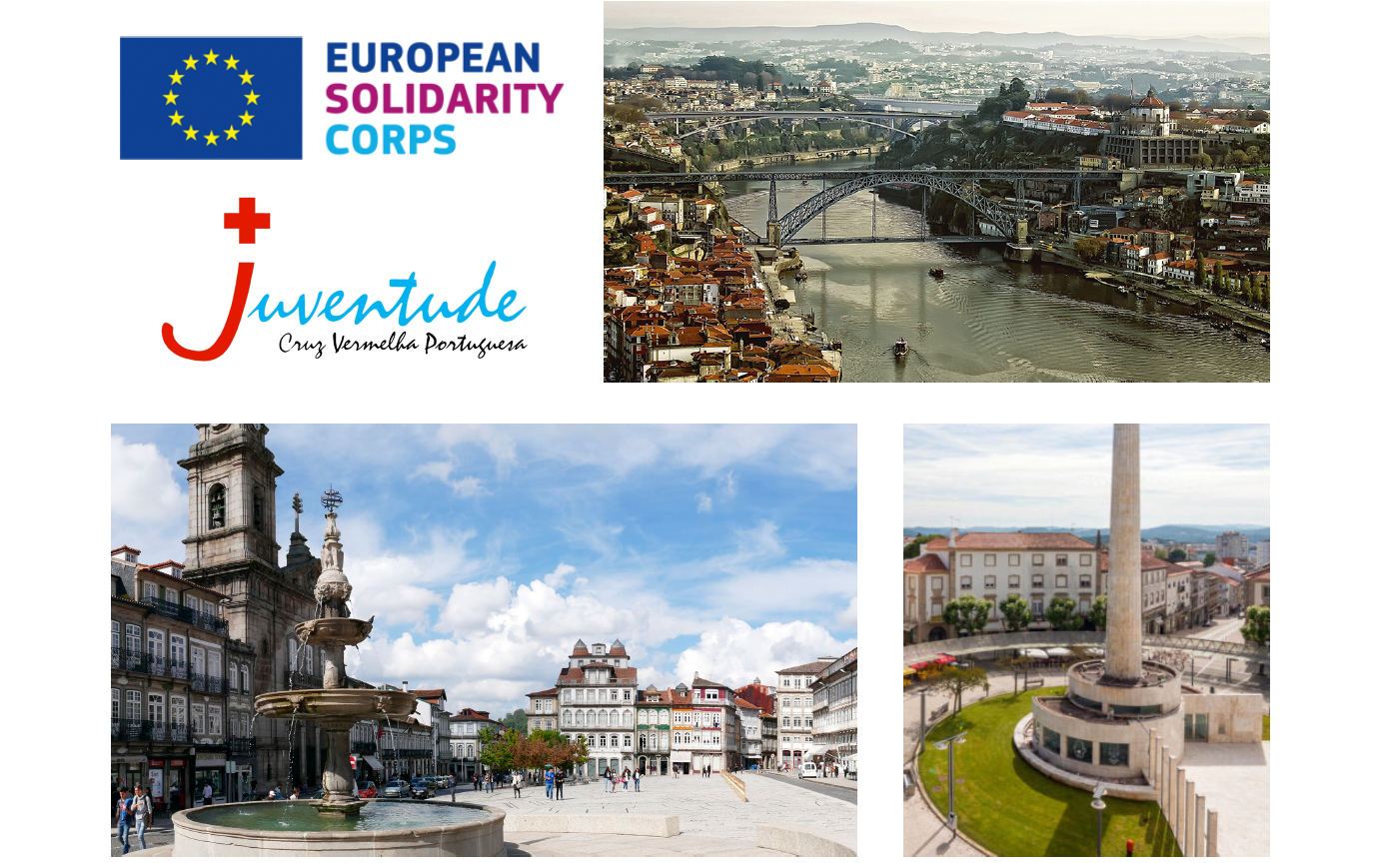
Partenerul nostru Portuguese Red Cross – Youth Department , din Portugalia, caută un tânăr sau o tânără pentru un proiect de voluntariat internațional ce începe în iunie 2019 (pentru un an de zile). Voluntarii vor organiza activități concentrate pe incluziunea socială a copiilor și tinerilor vulnerabili și pe dezvoltarea propriilor abilități și competențe. De asemenea ei vor lua parte la planificarea de evenimente, comunicarea și promovarea online și vor avea și posibilitatea de a-și pune în aplicare propriile idei.
Prin urmare, dacă:
- ai între 18 și 30 de ani
- îți place să înveți și ești curios
- ești activ, lucrezi cu entuziasm și responsabilitate
- ești sociabil și te poți organiza și singur când e cazul
- ești creativ și dornic să îți pui ideile în practică
- înțelegi și vorbești engleză acceptabil
- ești dornic/ă să înveți portugheză
ești potrivit pentru proiectul nostru de voluntariat.
Partenerii noștri din Portugalia îți vor asigura cazarea într-o casă împreună cu alți voluntari, o alocație pentru masă, bani de buzunar și transport local. Pe lângă asta, primești asigurare medicală și rambursarea transportului până acolo și înapoi, în limita a 360 euro.
Ce altceva mai primești?
- cunoștințe și abilități de planificare, organizare și implementare de activități educative și sociale
- posibilitatea de a-ți transforma ideile în proiecte și de a avea o influență pozitivă
- experiență de muncă în lucrul cu copii și organizarea de evenimente
- traiul independent și într-o altă țară
- posibilitatea de a învăța portugheză și de a-ți extinde cercul de prieteni.
Mai multe detalii despre activitățile organizației gazdă, aici.
Acum că știi cu ce se mănâncă proiectul ăsta, pune mâna și scrie-ne un email cu CV și scrisoare de intenție (ambele în engleză) atașate în care ne spui de ce crezi că tu ești potrivit pentru acest proiect, cât mai repede la sorin@curbadecultura.ro.
Tot acolo trimiți și întrebările și nelămuririle dacă ai vreounele.
Acesta este un proiect finanțat e Uniunea Europeană prin programul European Solidarity Corps.
